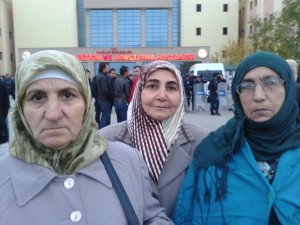(Geschreven voor een Engelstalige website, sorry, geen tijd om naar het Nederlands te vertalen.)
At least 1,700 people, including more than 680 prisoners, joined the strike before it ended on Sunday.
The brother of imprisoned Kurdish leader Abdullah Ocalan told SES Türkiye that a two-month hunger strike by hundreds of Kurdish prisoners ended to save the lives of the weakening prisoners, many who have been ingesting only tea and sugared water.
“To avoid death the strike was ended,” Mehmet Ocalan told SES Türkiye. “That was the message. People’s lives were in danger.”
At least 680 prisoners in 58 prisons joined the strike since it began September 12th, and several hundred supporters across the country joined the protest before it ended on Sunday 18 November.
Most of the prisoners were incarcerated for PKK membership or charges stemming from pro-Kurdish political activities.

The mothers of many imprisoned hunger strikers were hoping for news about their family members after the protests ended.
The hunger strikers demanded that Abdullah Ocalan be allowed to meet with his lawyers, and that obstacles to education and conducting legal defenses in Kurdish during court proceedings be addressed. Ocalan has been held in isolation in an island prison south of Istanbul.
The strike ended without accords on those measures, although the government has asked lawmakers to pass a motion allowing defendants to use Kurdish language in court testimony.
The government welcomed the end of the hunger strike. “I hope we will not face such protests from now on,” Deputy Prime Minister Bulent Arinc told the state-run Anatolian news agency. “Whatever demands the people have, the government and politicians can air them in parliament.”
It remained unclear if the end of the strike would result in a lessening of fighting between the PKK and government forces. The government blames the increased violence on the hostilities in neighbouring Syria.
Outside a hospital in Diyarbakir, about 200 people applauded and shouted support as ambulances carrying hunger strikers from a nearby prison took inmates for examinations before they resumed taking food.
Suret Sengül, whose son, Ercan, was among the first prisoners to begin refusing food in September, said she had little information about his condition. She is worried that the strike will have long-term effects on her son’s health.
“We don’t get any information,” she told SES Türkiye. “I am not even sure if he is already in hospital, or still in prison. Nobody keeps us posted, nobody knows anything.”
Feyziye Kolekan has three sons in prison: Ahmet, Mustafa and Mahsun. She is not totally sure how long they joined the hunger strike, and also has no clue about their whereabouts or their health situation. She said she was happy to hear that the strike is over. “But now,” she said. “I am only worried.”
One woman, who said she has two sons in prison and only gave her last name of Celik, said she still worries about her children.
“We don’t know what is going to happen next,” she said. “We are scared. The hunger strike has ended, but the conflict hasn’t. … Of course, it’s good that everybody made it through the hunger strike alive, but it doesn’t mean their lives are saved.”


Recente reacties